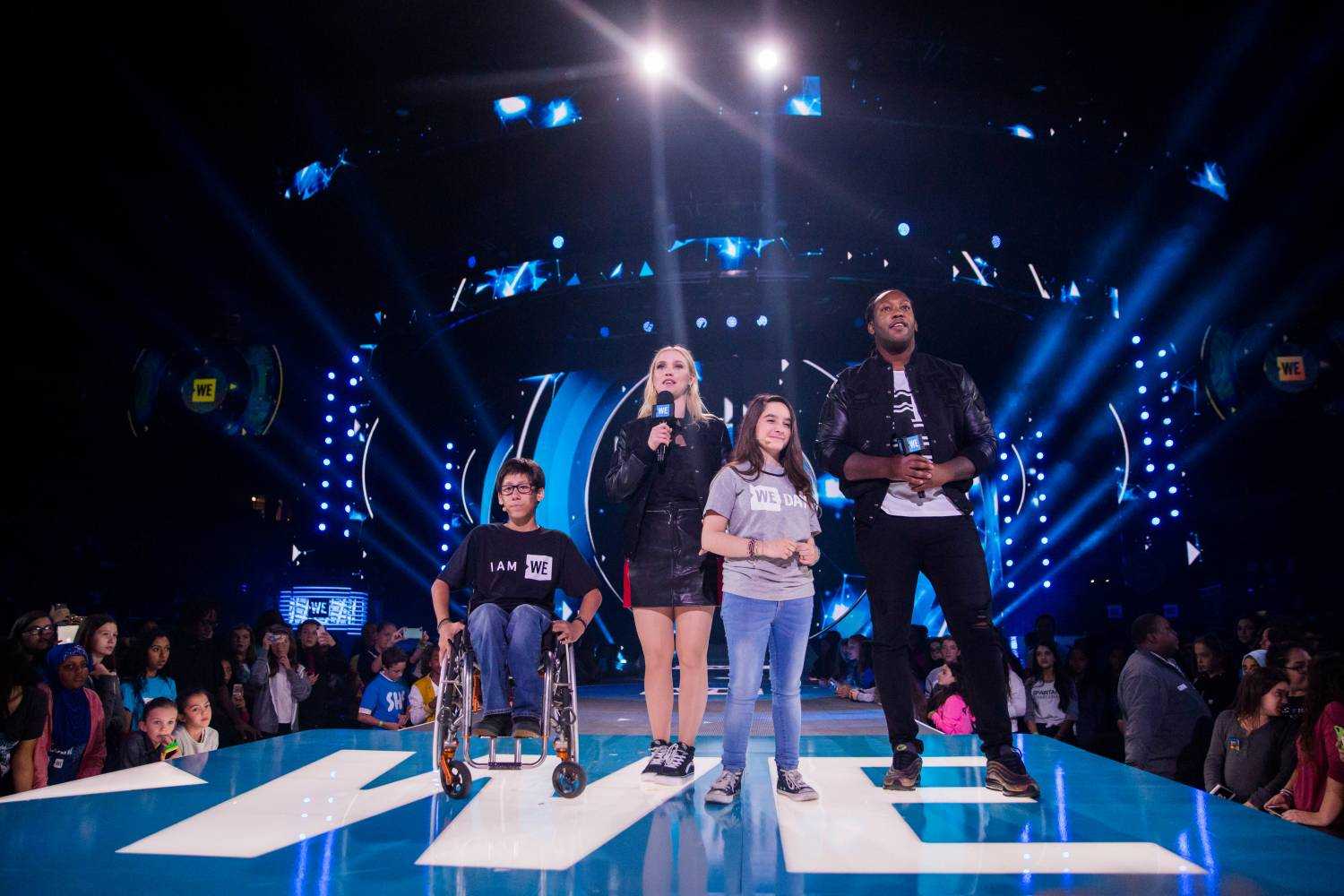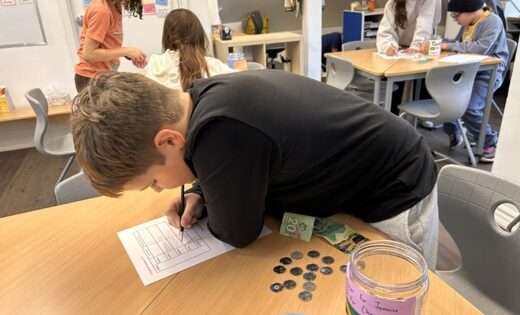on
BY: ALYSSA MAHADEO
Young people have unlimited potential to reshape today’s world into tomorrow’s possibilities.
On Thursday, September 28th, the Air Canada Center was filled with thousands of young people buzzing with excitement, inspiration, and creativity as they celebrated the WE movement at WE Toronto; a day filled with powerful performances, educational speeches, and empowering moments for the next generation of changemakers.
WE Day is a part of WE, a family of organizations making ‘doing good, doable.’ It is the manifestation of the WE movement, an ocean of people coming together to create impact.
WE is made up of WE Charity, empowering domestic and international change, ME to WE a social enterprise that creates socially conscious products and experiences to help support the charity, and WE Day filling stadiums across the world with the greatest celebration of social good. WE allows youth and families to help make the world a better place by supporting 2,500+ charities worldwide volunteering millions of hours of service, shopping daily with an impact, and raising millions of dollars that will directly benefit their local communities and the world.
WE was founded more than twenty years ago by social entrepreneurs and brothers Craig and Marc Kielburger, and together with their team across the globe in Asia, Africa, and Latin America have been able to provide more than 1 million people with clean water, build 1,000 schools and classrooms overseas and empower more than 200,000 children with access to education.
“We’re honored to celebrate with young change-makers from Generation WE, who have earned their way to WE Day by taking action on local and global issues,” said Craig Kielburger, co-founder of WE.
“Today, WE Day Toronto and WE Day Family unite hard-working students, educators, and families as they experience a day of inspiration while celebrating their incredible achievements in service.”
The reception at WE Day Toronto was phenomenal with thousands of young people and their families coming together and filling the ACC with energy so infectious you can’t help but feel pride and hope for the next generation and their ability to take action.
The crowd was a mixture of students, and people dedicated to leaving a lasting impact in this world, demonstrating strength in numbers. Students aren’t able to buy a ticket to WE Day, but instead, they earn their way in by the actions they take on, one local and one global cause of their choice. WE Day unites world-renowned speakers and award-winning performers with thousands of young people and families to celebrate and inspire another year of incredible change.
This year students were treated to a dynamic and engaging show that featured local and international celebrity speakers, activists, bloggers and youth advocates including Sabrina Carpenter, Sofia Carson, Andre De Grasse, Mia Farrow, Rick Hansen, Hedley, Vanessa Hudgens and Shawn Hook, Gaten Matarazzo, Penny Oleksiak, Lilly Singh, George Takei, Jacob Tremblay, Alexandre Trudeau, Spencer West, Former Secretary-General of the United Nations Ban Ki-Moon, alongside international activists and WE co-founders, Craig and Marc Kielburger, WE Day Toronto host Kelly Clarkson, event hosts Tyrone Edwards, E!/Much host, and Liz Trinnear, ETALK reporter and Much host, and youth hosts Hannah Alper and Tai Young.
The cast of returning WE Day fan favourites and new faces joined 20,000 students and educators to celebrate the contributions of young people and kick-start another year of change. They were able to hear powerful stories of different causes surrounding equality, social justice, cyberbullying, and many other issues that affect young people today. WE Day has been designed to provide young people with a platform, to have their voices heard, and to share and problem solve their questions and concerns with their peers and the masses.
Over the lunch hour, there was a special one-time outdoor event and celebration hosted by WE called WE Run: Fast like De Grasse. The event was in celebration of Canadian sprinter and three-time Olympic Medalist Andre De Grasse hailing from Markham, ON who first made a name for himself sweeping the 100m and 200m events at the Toronto 2015 Pan Am Games before winning medals at the 2015 World Championships and 2016 Olympics.
At WE Run, Andre showcased his speed against special WE Day racers, including local star students and WE Day speakers like Penny Oleksiak, Jacob Tremblay, Milly Davis and Craig Kielburger on a 60m track on Air Canada Centre’s Bremner Loop. This free public event took place during the WE Day Toronto intermission, and fans of sport and social good alike are invited to cheer on the racers as they dashed to the finish line.
In addition to all of the day’s excitement and celebrations attendees to WE Day were treated to a surprise special guest appearance from Prince Harry in town for the 2017 Invictus Games.
“Today you are all saying no to pessimism and cynicism here in Toronto with both WE Day and the Invictus games we say yes to optimism, yes to hope and yes to belief.” Prince Harry shared. “We are putting service and giving back at the heart of everything that we do. The thousands of you gathered here are proof that today’s generation of young people is the most connected, the most energized and most confident that the planet has ever known.”
The Prince, the embodiment of his mother’s values and teachings went on to say, “You know that differences of opinion, of circumstance, of race and religion are to be respected and celebrated.” earning a magnificent round of applause from the reception that filled the ACC.
At WE Day everyone is encouraged to share and contribute to positive change by joining existing social initiatives or sparking new ones. WE Day supports young people in every aspect to help make positive impacts and not only help young people do good for others, but help young people do better for themselves.
WE Day Toronto is made possible through the efforts contributed by Telus and RBC working closely with WE to enable young people to continue to learn how to help others and acquire more of the skills they need to succeed. Together they have a shared vision to help engage and empower youth to harness their innovative ideas, make positive change, and become community leaders both locally and globally.
As co-title sponsors, Telus has been a proud sponsor of WE Day for six consecutive years starting the #RiseAbove Conversation to help take a stance against cyberbullying and empower youth to act when witnessing or experiencing it. RBC works closely in over 8,000 WE Schools across Canada helping to develop curriculum and academic programming for students to help them build the skills they’ll need to succeed in the future workforce, develop compelling virtual motivational and learning experiences through workshops building the skills of social entrepreneurship.
“WE Day celebrates a generation of empowered youth, who have come together in the hope that the world can be better a place,” said Craig Kielburger, co-founder of WE. “You couldn’t imagine a more incredible energy as the stadium fills with the country’s next generation of changemakers, committed to making a lasting difference across the globe. This year alone, we saw more than 3,000 schools and youth groups from across Ontario rise to the challenge of creating sustainable change, proving that together, we can make doing good, doable.”
WE Day Toronto is followed by WE Day Toronto Family in the evening. The special evening event provides a unique opportunity for friends, families and community partners to come together to watch inspirational speakers and world leaders share their stories of positive change, motivating families to make a difference in their communities and around the world.
WE Day is an annual event, open to all causes and organizations. They make stops at fourteen locations across North America and in the UK. Throughout all platforms including WE Schools, people are invited to choose the causes at home and around the world that matter to them. WE Day cheers for 1,000+ causes and the everyday heroes that support them. This year alone over 200,000 young people will come together in fifteen stadiums across Canada, the US, and the UK.
Join the movement today at WE.org, and help make a difference!
Stay in the loop with exclusive news, stories, and insights—delivered straight to your inbox. No fluff, just real content that matters. Sign up today!
Modern Batik Couture Brought To Oakdale CC












